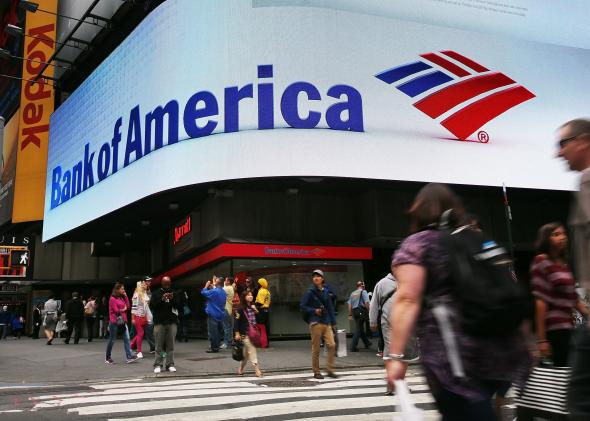Finally, we have a hat trick. Today, the Justice Department officially announced that Bank of America would pay a record $16.65 billion to settle allegations that the bank knowingly packaged dud mortgages into securities and sold them to unwitting investors without fair disclosures. The agreement follows similar multibillion-dollar deals with Citigroup and JPMorgan Chase & Co., and is just about equally unsatisfying for anybody still angry about the events of 2008.*
And the government knows it. Just check out the defensive coda in Attorney General Eric Holder’s speech announcing today’s settlement:
I want to be very clear: the size and scope of this multibillion-dollar agreement go far beyond the “cost of doing business.” This outcome does not preclude any criminal charges against the bank or its employees. Nor was it inevitable, over these last few weeks, that this case would be resolved out of court.
The American people appreciate the reassurance. But let’s quickly review the big reasons why this settlement, like the ones that came before, feels so meager.
1. Nobody Is Getting Prosecuted
Yes, Holder is offering a slim reed of hope that somebody important might one day face criminal comeuppance for the actions that set the economy on fire. But given the government’s record so far, it doesn’t seem particularly likely. It’s important to be clear why this matters. The threat of criminal prosecution probably isn’t going to prevent the next great crisis. It might help a little by giving bankers an incentive to think long and hard about doing anything that might fall into a legal gray area. But pushing iffy, combustible assets onto foolish clients is coded into Wall Street’s DNA. And so is a measure of straight up law breaking. It’s not as if insider trading suddenly disappeared after Michael Milken went down for it.
No, this is an issue about fairness. If there was criminal fraud, somebody ought to go to jail for it. That’s the point of having criminal laws. But because the Justice Department has been so cripplingly hesitant to bring prosecutions in cases where it believes there was even a small chance of losing, it’s hard to tell how many people, if anybody, might have done something worthy of jail time. We’re all just left with a vague sense that somebody got away with financial murder—which is infuriating.
To give the Justice Department its due, it probably could have gone a lot easier on Bank of America than it has. Most of the behavior in question actually happened at Merrill Lynch and Countrywide Financial before the bank purchased them in the middle of the financial crises.* Bank of America’s lawyers apparently tried to argue that it shouldn’t have been punished for the sins of its acquisition targets, but the government didn’t give in. Also, the New York Times notes that prosecutors are prepping a lawsuit against ex-Countrywide CEO Angelo Mozilo, one of the single worst actors of the entire subprime era.
But that’s just one especially awful executive. It’s like the entire population of Arkham Asylum escaped and ransacked Gotham, and the authorities responded by bringing a civil case against the Joker.
2. Bank of America Isn’t Really Going to Pay $16.65 Billion
That $16.65 billion is an extremely mushy figure. First, a large portion of it will be tax deductible as a “loss.” Second, only about $9 billion is going to be paid in cash. The other $7 billion and change come in the form of consumer aid, such as principal reductions for troubled borrowers (which the bank should frankly be doing anyway, for the sake of its own business) and donations for struggling communities. But, as the AP reported, those aid dollars might not be all that they seems
Under Citi’s deal, for example, each dollar spent on legal aid counselors is worth $2 in credits, and paper losses on some affordable housing project loans can be credited at as much as four times their actual value.
How much the total package of cash and non-cash borrower aid is worth is impossible for outside observers to say.
The issue here isn’t that Bank of America’s fine isn’t big enough, or that they’re somehow pulling one over on the government by writing off part of the cost of their punishment. Lawyers for both sides are well aware that the bank will be taking tax credits on the deal, and presumably negotiated the size of the fines accordingly. And frankly, we don’t want prosecutors levying penalties big enough to actually destabilize a major bank, because we still haven’t figured out a way to deal with too-big-to-fail. Rather, it’s about transparency. It’s hard to feel like justice is being served when the attorney general knowingly gets up on stage and trumpets an inflated dollar figure in order to get a few oohs and ahs from the press. Rather, it feels like we’re being lied to via omission—kind of like those investors who got duped.
*Correction, Aug. 21, 2014: This post originally misspelled the names of JPMorgan Chase & Co. and Merrill Lynch.
